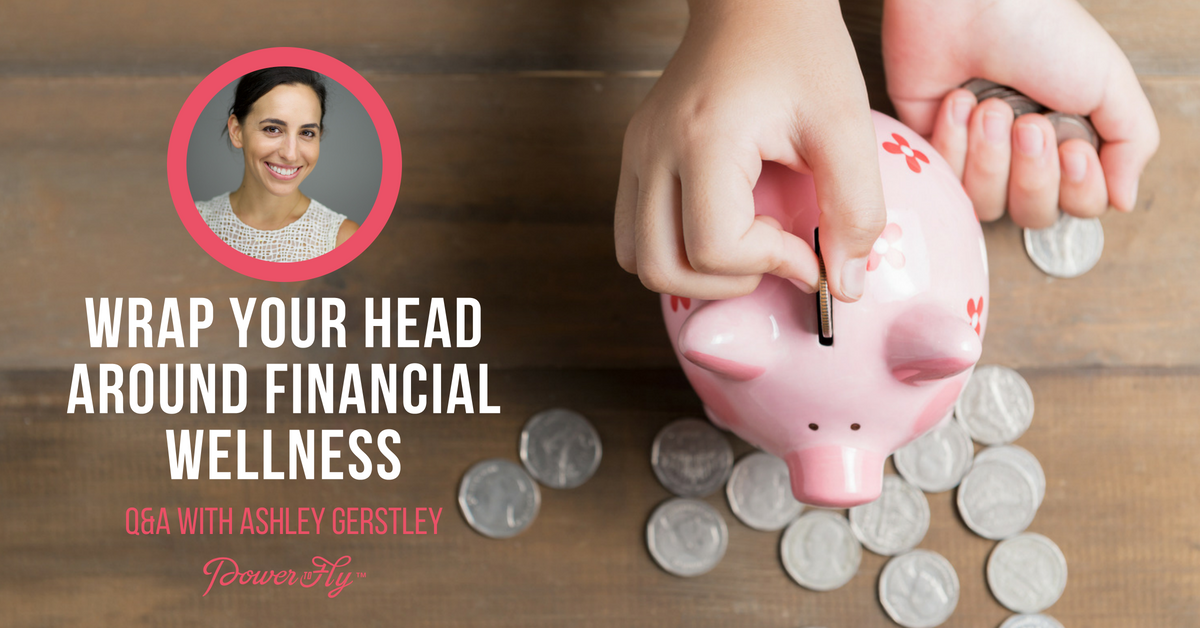Let's be honest here, no one likes to talk about money, and I'm sure I'm not the only person who jokes about the glaring number on my bank statement. Starting today, it's time to tackle our finances head on and start holding ourselves accountable for our future financial wellness. After sitting down with Ashley Gerstley, Money Coach, Founder of the Fiscal Femme, and creator of the 30-Day Money Cleanse, I learned that in order to achieve true financial wellness, finances need to be celebrated - even if that means small victories. How do we achieve those small victories, you ask? Read on to learn Ashley's tips for getting out of debt, and how you too, can hold yourself accountable for your financial wellness!
Want to watch the entire chat? Become a PowerToFly VIP and you'll receive exclusive access to live conversations with women like Ashley, as well as the recordings!
Q: I feel like I'm in way over my head - where do I even start?
Ashley Gerstley: Let's start with what I like to call a "money party". Every other week I would dedicate some time (and when I say dedicate some time, I mean put it on your calendar) to sit down look at all of your expenses for those two weeks, check those numbers with your financial goals, and make an agenda. This will help you keep track of your subscriptions, alert you if there's something you need to cancel, and just bring attention to what you're actually spending money on.
Q: What is a "happiness allocation" and how can I accrue one?
AG: I use the term "happiness allocation" instead of "budget" because when I say the word "budget" I can just feel the expenses being pried away from me. I want you to look at your giant pie of money, and think about what is going to truly make you the happiest, and not just at that moment. We're so consumed by this "treat yourself" movement, when in reality, if what you really want is to take a trip, that moment of treating yourself is really taking away from your true happiness allocation. Another tip is to look at your spending plan annually, not weekly, or even monthly. When looking at expenses annually, you can look at your spending habits more honestly and disperse some expenses into your happiness allocation.
Q: What are your best tips for getting out of debt?
AG: Let's talk about the practical debt steps. First, and this reverts back to the money party, you're going to want to take inventory of all of your finances, and I mean ALL finances. Write down every loan, credit card, dollar owed to a friend - complete with the balance amount, interest rate, minimum payment due, credit limit, and payment date.
Second, you want to prioritize these debts and rank them with actual numbers. There are three ways to do this, the interest rate method, the snowball method and the emotional method. The interest rate method is pretty self explanatory - you pay off the highest interest rate debts first because technically they are costing you the most money. The snowball method is where you pay off the smallest pieces of debt first regardless of interest rate. The reason this works well is because it feels really good to cross a piece of debt off! The emotional method is where you pay off whatever piece of debt will make you feel the best (think owing a friend lots of money - paying this off may save a friendship). The key here is paying off what motivates you; when you're motivated to pay off debts, the entire process is going to be more successful.
Finally, once the debts are prioritized, you're going to start making the minimum payments on all of your debts except for whatever debt is your number one priority until you pay it off. It feels good to put money towards our debts, but just remember, you still need money to live! Make sure you are putting enough money aside to not only pay off your debts, but to live comfortably without accruing more debts.
Q: Should I have a rainy day fund? If so, how much should I have saved?
AG: Absolutely - and if you're a homeowner, you should probably have a separate fund just for a major household expense should one arise. When planning for your rainy day fund, think about how many months you would feel "comfortable" should an emergency arise. This can be a scale - think "right now I'd be ok with two months, but ideally I'd like to have six". Just by putting a small amount over time into a checking account for a "rainy day fund" will ensure that if anything were to ever happen, you won't have to put every expense onto a credit card - thus accruing more debt.
Q: Pay off debts or invest in my future? Where do I start?
As far as paying off debts vs investing in your future, it really depends on what your goals are. If you're thinking about investing in retirement or your child's education - think of it this way, there aren't loans for investing in your retirement. You either have it, or you don't, where as student loans exist.




